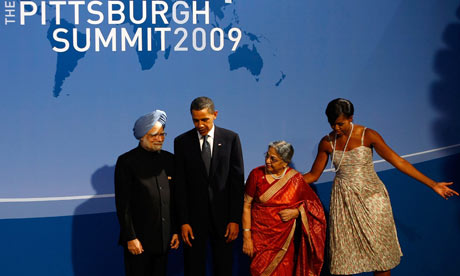
G20 leaders will today agree plans to reshape the world economy and give more say to developing nations such as China, India and Brazil when they conclude their summit in Pittsburgh.
The reforms will secure a seat at the top table of global economic policy for emerging nations, with world leaders agreeing that the G20 should become a board of directors on global economic co-operation, shifting the decades-old global balance of power away from Europe.
The G20 group, which includes Argentina, Indonesia, Saudi Arabia and South Africa, will replace the G7, which for more than three decades has dominated the world financial stage. The deal was thrashed out by Barack Obama, who is hosting his first major summit as US president.
The agreement, to be officially announced today at the conclusion of the Pittsburgh summit, will see the world's richest nations pledge to retain emergency economic supports until recovery is secured and work together to tackle climate change. They will agree to tighten banking regulation in an effort to avoid a repeat of the last two years' global economic turmoil. Governments across the world have pumped an estimated $5tn into their economies to deal with the greatest shock to the system since the 1930s.
"Today, leaders endorsed the G20 as the premier forum for their international economic co-operation," said a White House statement after a summit dinner last night. "This decision brings to the table the countries needed to build a stronger, more balanced global economy, reform the financial system and lift the lives of the poorest."
Divisions remain over the questions of bankers' pay. France and Germany are holding out for tougher restrictions on the highly paid executives blamed for bringing down the world financial system.
The US treasury secretary, Timothy Geithner, said there had been progress on pay and that G20 countries had reached a consensus on the "basic outline" of a proposal to limit bankers' compensation by the end of this year. He said it would involve setting separate standards in each of the countries and would be overseen by the Financial Stability Board, an international group of central bankers and regulators.
His comments came shortly after the European commission president, José Manuel Barroso, again pressed for the limits.
"Europeans are horrified by banks, some reliant on taxpayers' money, once again paying exorbitant bonuses," Barroso said. "It is important we take action."
Geithner offered the prospect of greater voting rights in the International Monetary Fund for Asian countries over the reservations of European nations, who would lose influence. Given the rise of China's economic power "it's the right thing" and Europe recognised this, Geithner said.
Neither the G7, which was created in the 1970s as the oil crisis struck western economies, nor the G8, which includes Russia, will be disbanded. The latter will instead focus on issues such as national security, while diplomats say the G7 will deal with geopolitical issues.
The new role for the G20 as the premier forum for international economic co-operation will begin with two summits next year, in Canada and South Korea, then annual summits.
0 comments:
Post a Comment